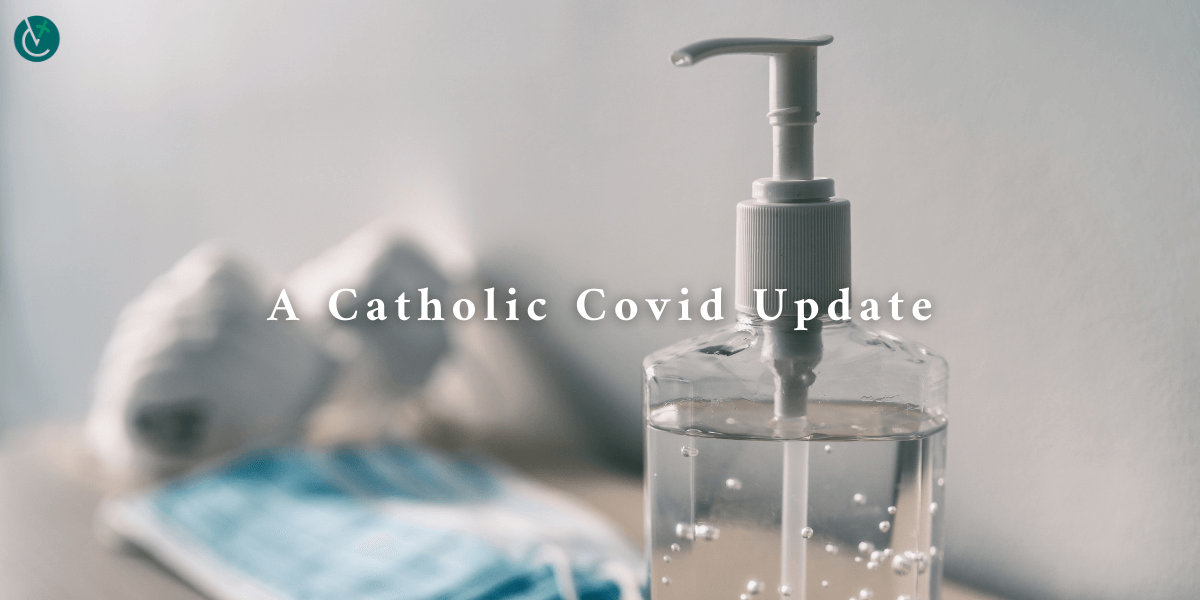
A Catholic Covid update
It has been about a year since life changed drastically because of the Covid-19 pandemic, and although strides have been made with knowledge about how to fight the coronavirus and vaccinations to prevent its spread, Vermont Catholics cannot let these developments or pandemic fatigue cause them to let down their guard and stop following guidance to wear a mask, maintain social distance and continue proper hand-washing procedures.
That’s the message from a Vermont deacon who is a member of the International Association of Catholic Bioethicists and the National Catholic Bioethics Center and from the Diocese of Burlington’s director of worship.
“Even as people are being vaccinated, others are still contracting the disease. Public health officials continue to urge people to continue to wear masks and maintain social distances, to
wash their hands frequently, especially after touching surfaces likely to have been touched by others,” said Deacon Pete Gummere, who is certified in Catholic healthcare ethics by the National Catholic Bioethics Center and is a clergy member of the Catholic Medical Association.
“The risk of transmission will remain elevated for some time.”
And according to Director of Worship Josh Perry, individual choices that one makes to follow or disregard guidance have a ripple-effect on church communities, in either a positive or negative way. “So even as the vaccine becomes more widely distributed in the coming weeks and months, it’s important to keep the mask-wearing, hand-washing (which is really a good idea with or without a pandemic) and physical distancing up,” he said. “Approaching this virus from multiple angles of mitigation will help us overcome it more quickly.”
Parishes in the Diocese are following protocols for the public celebration of sacraments, and the Diocese will issue guidance and recommendations when it comes to upcoming celebrations – for Lent and Easter, for example — but the overall guidelines for celebrating liturgy remain unchanged and center around mask-wearing, physical distancing and hand-sanitizing.
“Despite the strong feelings that people have about the protocols in general, the Catholic Church in Vermont has received the protocols from the bishop rather openly,” Perry said. “When we first re-opened in June, I think there was a sense of relief and gratitude that our churches were once again available for public celebrations of liturgy. We tweaked the protocols and opened things a little bit more later in the summer.”
Many questions and suggestions came to the Bishop’s Office and the Office of Worship about how best to implement the protocols. “As we progressed in the fall, we realized that these protocols have kept our churches open for worship. In March, no one could imagine that in early 2021, we would still be dealing with this as much as we are. But the Church is indeed pulling through it,” Perry said.
Addressing questions about vaccination, Deacon Gummere prefaced his answers saying his comments are “fully consistent” with the teaching of the Catholic Church, specifically the
U.S. Conference of Catholic Bishops and the bishop of Burlington.
There is no absolute Church teaching for or against vaccination to protect against Covid-19. It is a personal choice that should be based on moral principles, which he noted, include the Fifth Commandment and the law of love — or charity — that “tells us to take good care of our own health and that of our neighbor.”
He noted that a moral question does arise in connection with the fact that both of the vaccines licensed in the United States (Pfizer and Moderna) were developed in the laboratory using cells derived from a long-established line of embryonic stem cells obtained through abortion, though, he pointed out, the production of these vaccines is done without further or on-going reliance on tissues derived from abortion.
“Therefore, because of the need to care for our own health and that of others (Fifth Commandment and law of love) and because we do not join in the intention of abortion, the bishops have instructed that we may receive the vaccines,” said Deacon Gummere, who has served as an adjunct faculty member at the Pontifical College Josephinum where he taught Medical Morality for Deacons and Moral Theology for Deacons and who consults within the Diocese of Burlington on matters of bioethics. “The preferred vaccines are those with a less direct connection with abortion (i.e. Pfizer or Moderna), provided that no vaccine that is free of any connection is available.”
As the world — and the people of the Diocese of Burlington — continue to deal with the pandemic, Perry urged everyone to continue to have patience and charity with pastors, parish staff and parish volunteers such as the ushers who are encouraging them to sanitize their hands as they enter the church.
“These protocols are tiresome. There’s no doubt about that. But they are important. They have allowed our churches to remain open despite the increase in cases in Vermont this fall and winter,” he said. “The health department, of course, urges vigilance in watching out for symptoms and to get tested if people feel it’s necessary, but they’ve determined that the protocols in place do reduce the possibility of wide-spread transmission.”
—Originally published in the Spring 2021 issue of Vermont Catholic magazine.

